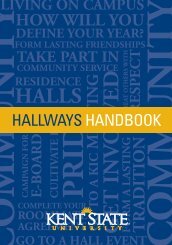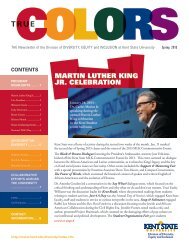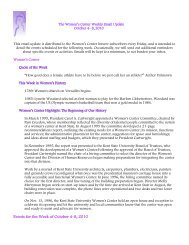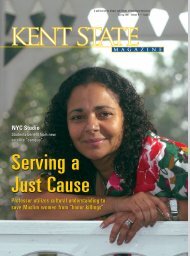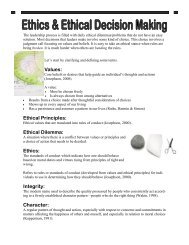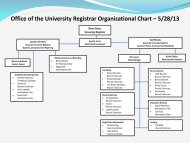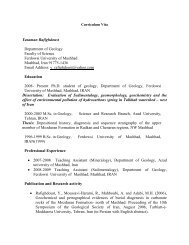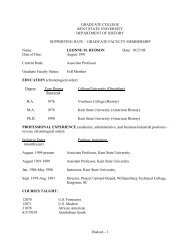Lester Lefton Lester Lefton - Kent State University
Lester Lefton Lester Lefton - Kent State University
Lester Lefton Lester Lefton - Kent State University
Create successful ePaper yourself
Turn your PDF publications into a flip-book with our unique Google optimized e-Paper software.
By Melissa Edler, ’00<br />
Photograph by J e f f G l i d d e n , ‘ 8 7<br />
Dr. Gregory Shreve, chair, Department of<br />
Modern and Classical Language Studies, and<br />
Dr. Françoise Massardier-Kenney, director,<br />
Institute for Applied Linguistics.<br />
late by other countries’ standards.<br />
Despite the fact that it<br />
has been shown to be more<br />
effective to teach language at<br />
an earlier age, the majority of<br />
U.S. schools continue to start<br />
teaching foreign language<br />
when students begin high<br />
school, while their European<br />
counterparts begin by the<br />
age of 8.<br />
“Translation never developed<br />
as an academic discipline<br />
in the United <strong>State</strong>s,<br />
partially because foreign<br />
language scholarship took<br />
a high-culture approach to<br />
foreign language by studying<br />
literature and poetry and not<br />
the practical applications of<br />
language use, such as in business,<br />
law, science, medicine<br />
and other fields,” says Shreve.<br />
Americans<br />
visiting foreign<br />
countries learn<br />
quickly how<br />
much we lack<br />
knowledge and<br />
training in<br />
foreign languages<br />
and<br />
cultures.<br />
This writer<br />
experienced it<br />
personally<br />
when my<br />
husband and<br />
I traveled to<br />
South Africa a few years ago.<br />
At one point, South Africa<br />
was colonized by the British.<br />
As a result, the country’s<br />
national languages today<br />
are English and Afrikaans.<br />
However, the continent of<br />
Africa is made up of hundreds<br />
of tribes with their own<br />
unique dialects, and South<br />
Africa is no exception.<br />
For most of our trip, we<br />
had no trouble communicating<br />
with South Africans,<br />
as everyone we met spoke<br />
perfect English, though with<br />
a British accent. During our<br />
last week there, however, our<br />
rental car got a flat tire 20<br />
miles from the nearest town.<br />
We were fortunate enough<br />
to find an auto garage in the<br />
next town. But when the<br />
tow truck arrived, we didn’t<br />
understand a word spoken by<br />
either of the two men from<br />
the garage. So they stopped<br />
trying to say anything to us.<br />
We watched dumbfounded<br />
as the men jacked up our<br />
car, took the tire off the rim,<br />
threw it in the back of their<br />
truck and drove away without<br />
a word. “Well, that jack is<br />
worth a lot of money, so I’m<br />
sure they’ll be back,” said my<br />
husband. He was right.<br />
Why does the United<br />
<strong>State</strong>s, which is so far<br />
behind most of the world<br />
in language training, seem<br />
uninterested in catching up?<br />
As a country, we’ve had a<br />
cultural block against multilingualism,<br />
says Shreve.<br />
When immigrants came<br />
to the United <strong>State</strong>s, a<br />
“melting pot” nation, they<br />
were expected to acclimate<br />
in order to find and keep<br />
jobs. In doing so, many lost<br />
their cultural practices and<br />
language. For those who<br />
wanted to keep their language<br />
alive, there were no<br />
resources available to do so,<br />
adds Massardier-Kenney.<br />
In Europe, countries are<br />
smaller and closer together,<br />
giving Europeans a greater<br />
need to speak more than one<br />
language. Their governments<br />
are required to conduct politics<br />
and business in several<br />
different languages.<br />
But the world is a different<br />
place today in terms of immigration<br />
patterns and international<br />
trade, and Americans<br />
need to communicate in<br />
everyone’s language, says<br />
Massardier-Kenney. More<br />
people speak Chinese than<br />
any other language in the<br />
world, and linguists estimate<br />
more than 6,800 distinct languages<br />
exist.<br />
“We must realize there<br />
are other languages in the<br />
world, and they’re economically<br />
relevant to us as well,”<br />
says Shreve.<br />
Imagine if Americans<br />
viewed language from an<br />
allocentric standpoint and<br />
joined the rest of the world,<br />
what we as the human race<br />
might be able to accomplish.<br />
Maybe we could even finish<br />
what we started long ago,<br />
the Tower of Babel.<br />
For more information on<br />
the translation program, visit<br />
www.kent.edu/magazine.<br />
Online Exclusives<br />
Who Says<br />
Language Doesn’t Pay?<br />
Being multilingual in the workplace<br />
may have an effect on your salary,<br />
says Dr. Don Williams, associate<br />
dean, College of Business Administration.<br />
Language<br />
Hindustani<br />
Spanish<br />
Russian<br />
Arabic<br />
Bengali<br />
Portuguese<br />
Malay-Indonesian<br />
French<br />
Chinese (Mandarin)<br />
English<br />
1,075,000,000<br />
514,000,000<br />
496,000,000<br />
425,000,000<br />
275,000,000<br />
256,000,000<br />
215,000,000<br />
194,000,000<br />
176,000,000<br />
129,000,000<br />
Sources: Ethnologue, 13th edition, and Information Please Database<br />
# of people who speak the language<br />
<strong>Kent</strong> <strong>State</strong> Interpreters<br />
on a Life-Saving Mission<br />
Peg Haas, instructor, Department<br />
of Modern and Classical Language<br />
Studies, alumna Maribel Sanchez,<br />
’03, and graduate student Liz<br />
Schreiner traveled as interpreters to<br />
Bluefields, Nicaragua, with a team<br />
from Radiology Mammography<br />
International.<br />
Read these stories at<br />
www.kent.edu/magazine.<br />
p a g e



